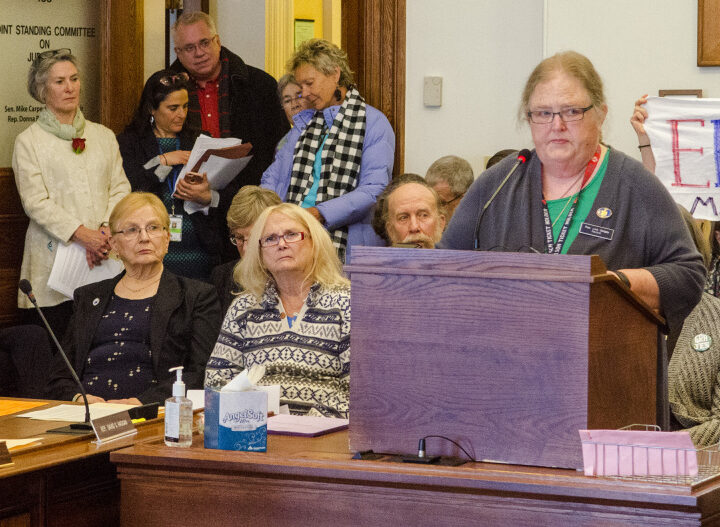ORONO — Friday is International Women’s Day, inspired by American garment workers’ struggle for fair pay and working conditions in the early 20th century. Similar efforts in Maine – an initiative to limit children’s and women’s working hours – united two disparate groups: feminists, who believed that the legislation hobbled women’s aspirations, and industrialists, who resisted legislative labor reforms. It would be decades before the rift between labor and feminists would heal and they would join forces on behalf of gender equality.
Supporters of the eight-hour workday for Maine women and children were emboldened by the establishment of the eight-hour day in 1914 for federal employees, in 1916 for those who labored on interstate railroads and in 1918 for workers involved in wartime production. Added to the mix was the wish to recognize the women who served so nobly in the labor force during World War I, the reform impulse unleashed by the women’s suffrage movement and fears that the failure to grant the shorter workday would encourage “Bolsheviks and un-Americans.”
In 1919 and 1921, legislation in Maine to enact an eight-hour day for women and children failed. The contest gave rise in 1920 to Associated Industries of Maine. Its commitment to retaining sovereignty over the workplace was reflected on its letterhead, which shouted, “We Believe Squarely in the American Open Shop.” The word “American” was clearly meant to link unionism to the recent Bolshevik revolution, fears of which were used to depict any individual or labor organization as disciples of communism.
In 1923, Maine workers turned to the instruments of direct democracy – the initiative and referendum – to express the “people’s will” on the proposed shorter workday for women and children and snap the baneful link between wealth and the political process.
Maine feminists found themselves allied with Associated Industries of Maine against the referendum. Opposition to restriction of hours of labor – the instinctive response of Maine industrialists – was echoed by feminists demanding freedom and equality. As one feminist broadside declared, “Give The Goddess of Liberty a Man’s Chance.” Quoting from the platform of the just-introduced Equal Rights Amendment, the demand was clear: “Woman Now Has The Equal Right To Vote: Now Give Her The Equal Right To Work.”
The referendum was defeated by nearly 20,000 votes. Though feminist opposition was only one factor among several variables, it was clearly perceived to be significant. As the National Woman’s Party and its proposed Equal Rights Amendment became increasingly visible, revealing the ideological fissures between organized labor and feminists, Maine Labor Commissioner Charles O. Beals remarked:
“Leaders in this movement are women who are not compelled to work in mills and factories amid the roar and vibration of machinery, and in some instances in artificial atmospheres, but rather in offices and in more pleasing and less exhaustive employments. It is my thought that if some of these objectors would, as an experiment, accept employment for a week, in, for instance, a weaving room in one of our large mills, I feel that they would better understand the motive of those who are instrumental in bringing about the restrictive measures.”
It wasn’t until the 1960s and 1970s that organized labor and the women’s movement made common cause, with feminists forging alliances with women workers. The national AFL-CIO endorsed the Equal Rights Amendment after the Civil Rights Act made protective labor laws unconstitutional. Maine AFL-CIO resistance to the ERA subsided after legislators ratified it in 1974. Now the support of only one more state is needed to fulfill a social revolution.
Against the background of the worldwide Women’s March calling for sweeping social reforms and the #MeToo movement’s equally global activism, the long struggle to enact the ERA appears to be regaining momentum. The women’s movement’s revitalization makes clear that the ERA is not ready to be consigned to the graveyard of history, and that relentless efforts to enshrine protection against sexual discrimination and secure gender equality in the organic law of the nation have become entrenched in the national conversation about social justice.
Send questions/comments to the editors.



Success. Please wait for the page to reload. If the page does not reload within 5 seconds, please refresh the page.
Enter your email and password to access comments.
Hi, to comment on stories you must . This profile is in addition to your subscription and website login.
Already have a commenting profile? .
Invalid username/password.
Please check your email to confirm and complete your registration.
Only subscribers are eligible to post comments. Please subscribe or login first for digital access. Here’s why.
Use the form below to reset your password. When you've submitted your account email, we will send an email with a reset code.